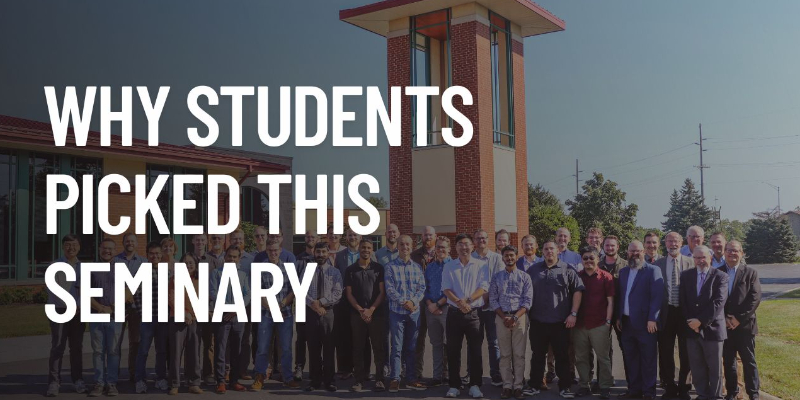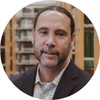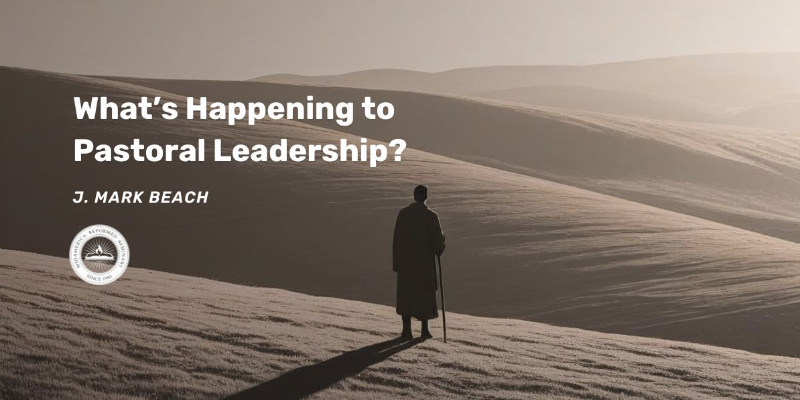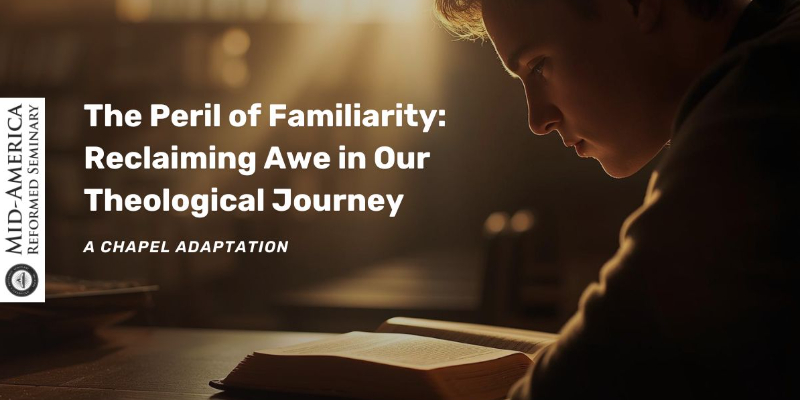
Introducing the Center for Missions and Evangelism
This article was previously published in the September 2021 issue of The Messenger.
Rationale for the Center for Missions and Evangelism
When Jesus rose from the dead, He gave a most beautiful promise to this church, “Behold, I am with you always, to the end of the age.” This promise is the engine that drives the Great Commission. It is through His church that Jesus carries out His mission of gathering a people for Himself—and He promised to be with His church until the end of the age, thus guaranteeing that neither sin, Satan, nor death could ultimately thwart the mission of the church.
It is helpful to remember this promise that Jesus is with us. Who could deny that these have been trying times for the church? We have experienced many humbling challenges in recent years as churches have had to deal with the reality of a pandemic, social justice and covenantal drift (the slow drift of some of our young people away from the church). At the same time, a providential stage is now set for the church to proclaim the hope of the gospel to a world that is lost and limping. The nations now live in our backyard, and gospel opportunities abound. People from all walks of life are coming to Christ, new disciples are being made, and many of our young people are sensing a desire to serve God in faithful yet creative ways. What the world needs most from the church is for us to remain faithful to God’s Word and to hold forth that message of gospel truth which alone can save souls and change lives.
In the midst of these challenging yet fruitful times, there are legitimate questions before the church. How shall we reach people with the gospel in an ever-changing, pluralistic society? How can local churches reach people who are unfamiliar with the Reformed faith? How can we plant churches together that will reach the lost while remaining committed to the ordinary means of grace (the preaching of God’s word, the sacraments and prayer, and the Reformed confessions?) Where will the next generation of missionaries come from, and how can we best recruit and prepare them for the work that lies ahead? Finally, how can we continue to uphold and encourage those who are already serving “in the trenches” so that fewer church leaders will experience burnout, discouragement, and attrition?
It is because of important questions like these that the Center for Missions and Evangelism (CME) has been instituted at Mid-America Reformed Seminary (MARS). Seminaries exist to serve the church, and it is a privilege not only to participate in the raising up of the next generation of pastors, church planters, and missionaries; it is also a privilege to contemplate all the ways we might come alongside those who are already doing kingdom work. It is also important to note that God is raising up young men and women who want to grow in their theological understanding and find ways to serve Christ’s church faithfully. Though MARS does not admit women into the M.Div. program (our pastoral track), it does offer a Master of Theological Studies (MTS) for men and women who want to grow spiritually through theological education in order to be better equipped for other forms of ministry and church leadership. Our enrollment is on the rise. These are exciting times for the Seminary and for the church!
Overview of the Center for Missions and Evangelism
There are four parts to the Center for Missions and Evangelism: Classes, Conferences, Cohorts, and Internships. Before describing these in detail, it is important to note that the core of what exists in the current Seminary curriculum will remain unchanged. The Faculty and Board of Trustees are keenly aware of the potential for “mission drift” that tempts all institutions. Thus, there is an unwavering commitment to retain the classes and instruction that cultivates a high degree of competence in the central areas of reading the Bible in the original languages, sound hermeneutics and exegesis, church history, apologetics, preaching, and pastoral theology. The new additions of the CME will be exactly that - additions to what the Seminary has historically taught, stood for, and faithfully maintained. But as we recognize that more is needed to help pastors, church planters, and missionaries to meet the challenges of ministry, the CME will seek to develop:
1) Classes. New classes will be added that seek to prepare students to think biblically and confessionally about practical areas of ministry. Such classes will be designed not only for seminary students contemplating the ministry but will also be scheduled and structured in a way that might make it possible for ministers to come and take a class if they wished. Thus, some classes will be offered in one-week, intensive formats instead of being spread out over a semester. Such courses would cover timely, important subjects such as Healthy Churches Planting Healthy Churches, Social Justice and the Church in Reformed Perspective, Recognizing and Addressing Abuse in the Church, Staying Healthy in Ministry, Foreign Missions in the Age of Pluralism, Preaching Christ in a Post-Everything World…and more.
2) Conferences. Only part of the CME’s work will be done on-site at the Seminary campus. A significant desire of the CME is to bring Christ-centered, Reformed, practical content to local churches who wish to spend a weekend focusing on timely subjects. The local church is irreplaceable. Insofar as the Seminary exists to serve the church, we want to spend time with local church leaders and members, presenting material and engaging in conversations that may help stir the church to greater faithfulness and excitement about participating in Jesus’ mission for His church. Possible conference topics might include those listed above but could also include subjects deemed vital to the local church. It is not the prerogative of the CME to tell the church what it should be considering but to listen to the church and help bring in speakers that can actually help address the issues before the church in a way that honors Christ and promotes the health of the church.
3) Cohorts. The difference between a conference and a cohort is that conferences are open to the public and designed to draw a crowd; a cohort, in contrast, is usually a more low-key, informal, invitation-only event. Cohorts are a way for church leaders to get together and talk about the things that weigh most heavily and urgently upon their hearts. Rather than a speaker standing at a podium in front of a crowd, cohorts usually bring in a speaker who sits in a room full of church leaders who listen to some presentations but then spend a lot of time talking openly about issues. Cohorts provide plenty of time to pray together as well as downtime just to build friendships; and yes, there is usually plenty of food!
4) Internships. When young men contemplate going to seminary, they are often unsure where that path will lead. Some may have a desire to serve local churches that are in need of a pastor; others may have a desire to plant churches in new areas or with core groups that are desiring to become a new church together; and yet others may even contemplate going to the foreign mission field and serving Christ in places far from home. How does a young person discern which way to go? Internships are an invaluable part of the preparation for gospel ministry. They help ministerial candidates discern their call in the context of being mentored by an experienced pastor, church planter, or missionary who can only help the seminary student ascertain whether or not they should go to one field of service or another. Internships also help ministerial candidates sharpen and refine their gifts for the ministry under the oversight of someone who has already done the work and can thus teach and model what a seminary student needs to learn. Thus, a significant desire of the CME is to develop stronger relationships with faithful pastors, church planters, and missionaries in various faithfully Reformed denominations so that seminary students might be paired with them for internship experience.
What Is My Role as the Director of the CME?
First, it needs to be understood that I am actively serving a local congregation—Harvest Orthodox Presbyterian Church in San Marcos, California. The church has very graciously agreed (voted unanimously) not only to allow me to serve as the director of the CME but is also calling an associate pastor to help me with the work of the church. My heart is in the local church. I love the church. But I also believe that seminaries exist to serve the local church, and I count it a privilege to help lead a program that has an interest in raising up and encouraging a generation of servants in Christ’s church. I am excited about this program; I am also profoundly aware of my own weaknesses and limitations. Most of my experience has been in the area of church planting and evangelism. While there are some areas I may be able to speak to, I have—for instance—never been a foreign missionary. I thus find it exciting to look beyond myself, and even beyond the resident MARS faculty, to find faithfully Reformed, experienced servants in the church who will be able to help serve in some of the areas described above.
Thus, the CME should be viewed as a collaborative effort. Neither the MARS faculty nor I can do all of the things we list above on our own. We need (and intend) to draw on the wealth of wisdom and experience God has given to others who have expertise that goes beyond our own. We intend to partner with other faithfully Reformed seminaries in an effort to share resources and co-labor with one another as those who are committed to Christ and his kingdom. In these challenging times, like-minded Christians need to bind together whenever and wherever they can. The unity and catholicity of the church demand it. We need each other—now more than ever.
What to Expect Next
At one level, the CME has been contemplated for some time by faculty, board members, and friends of the Seminary. At the same time, it has only come into more concrete form in the month of July. The Board of the Seminary has appointed an advisory and oversight committee to help with and oversee the CME. We are planning to have a soft launch this fall with a small conference at Redeemer United Reformed Church in conjunction with the meeting of the Board of Trustees on October 14 & 15. We are then looking to have an off-campus “hard launch” sometime in early 2022 at a desirable (think—warm!) location addressing subjects that would be of great use to the church and church leaders. We are considering the theme, “The Mission of the Church in a Post-Everything World.” Sometime this fall, our catalog will be updated, our webpage will be up and running, and we even hope to have promotional materials in place to share with churches and prospective students.
Conclusion: God Uses Means
I am currently preaching through the Gospel of Mark. One of the things that strike me is that while the Triune God has a mission to seek and save the lost, He is pleased to use means. The agent that He uses to carry out the Great Commission is the church. God works through the ordinary means of grace. Through the transformed lives and testimony of His church, God is continuing to gather His Bride unto Himself just as Jesus promised, “to the end of the age.” It is a great blessing to be a part of Christ’s church. Not only do we have the hope of heaven in our hearts—the great comfort of belonging to Jesus—we also have the great privilege of carrying that gospel to men and women, boys and girls from every nation, tribe, and tongue. Whether they live across the ocean or down our street, people need to hear the gospel. Jesus said, “Go.”
Please remember to pray for the work of the Seminary and the CME. Pray not only that we will remain faithful to God’s word and the riches of the Reformed faith; pray also that we will be able to help stir up and equip a rising generation to be the salt of the earth and the light of the world.

Dr. Eric Watkins serves as the Instructor of Ministerial Studies and the Director of the Center for Missions and Evangelism.
Recent articles




